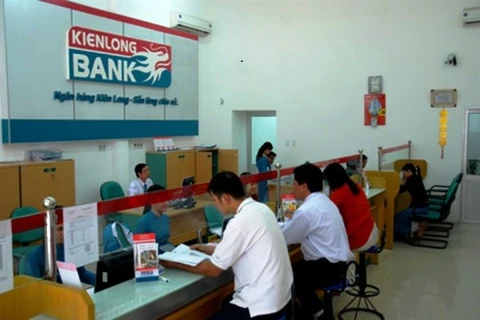Hanoi (VNS/VNA) - The State Bank of Vietnam (SBV) has decided to push ahead with restructuring the banking system, applying stricter measures to effectively prevent cross-ownership at commercial banks.
The SBV recently announced it is drafting a circular in a move to discourage cross-ownership among banks and encourage transparency in the capital contribution sources of shareholders.
Under the draft circular, a revision of Circular No 06/2015/TT-NHNN, banks must bring their ownership thresholds in line with limitations stipulated in Article 55 of the Law on Credit Institutions before June 30 next year.
Under the law, individuals are not allowed to own more than 5 percent of the charter capital of a bank, while the permitted ratio for an institutional shareholder should not be more than 15 percent, save for some cases such as ownership in distressed or equitised banks and ownership by a strategic foreign investor.
The central bank will impose harsh penalties on banks that fail to meet the deadline. Penalties include disapproval of the bank’s proposals regarding top positions, such as members of the board of directors and supervisory board and the CEO.
Non-compliant shareholders will also have their dividend rights and right to serve on the board of directors suspended, in addition to being prohibited from increasing their stake in their respective banks.
Besides the cross-ownership among banks, the Government has also take measures to prevent cross-ownership between banks and subsidiaries.
Under the Law on Credit Institutions, which was passed by the National Assembly and came into effect on January 15 this year, bank leaders are prohibited from taking up senior positions in other businesses.
The revised law has so far contributed in reducing cross-ownership between banks and subsidiaries as many banks have recently reshuffled their leadership at their respective 2018 annual general meetings of shareholders to comply with the new central bank regulation.
Banking expert Can Van Luc said many bank leaders had to resign from their positions as chair of the board of directors or CEO of business firms to continue managing banks. A number of business owners also had to give up chairmanship positions at banks to comply with the new law.
They were the most obvious examples of the decrease in cross-ownership, Luc said.
He said cross-ownership in banks has also been put under control as a result of their listing in stock markets. Stock market listing means information, especially those related to internal management and the ownership rate of shareholders, must be made public and subjected to close monitoring by the State Securities Commission.
However, experts suggested that a close supervision is still needed as some individuals can take advantage of loopholes in the law.
Finance and banking expert Nguyen Tri Hieu said that while the new law had a good impact on transparency in the area of ownership, State agencies must still monitor activities closely as some individuals who do not take leadership positions in banks may still have governing powers.-VNS/VNA

Transparent policies needed to draw foreign capital
Clear, transparent and efficient policies are needed to encourage more foreign investors to jump into the Vietnamese securities market if it is to reach its considerable potential.
























